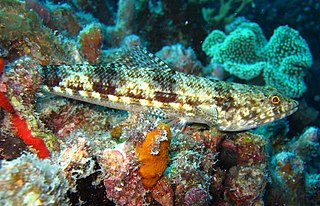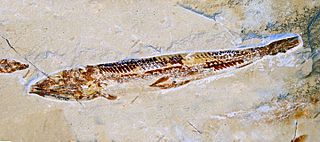
Aulopiformes is a diverse order of marine ray-finned fish consisting of some 15 extant and several prehistoric families with about 45 genera and over 230 species. The common names grinners, lizardfishes and allies, or aulopiforms are sometimes used for this group. The scientific name means "Aulopus-shaped", from Aulopus + the standard fish order suffix "-formes". It ultimately derives from Ancient Greek aulós + Latin forma, the former in reference to the elongated shape of many aulopiforms.

The Myctophiformes are an order of ray-finned fishes consisting of two families of deep-sea marine fish, most notably the highly abundant lanternfishes (Myctophidae). The blackchins (Neoscopelidae) contain six species in three genera, while the bulk of the family belongs to the Myctophidae, with over 30 genera and some 252 species.

Enchodus is an extinct genus of aulopiform ray-finned fish related to lancetfish and lizardfish. Species of Enchodus flourished during the Late Cretaceous, and there is some evidence that they may have survived to the Paleocene or Eocene; however, this may just represent reworked Cretaceous material.

Pantodontidae is a family of ray-finned fish in the order Osteoglossiformes. It contains the living freshwater butterflyfish of Africa, as well as several extinct marine species from the Late Cretaceous (Cenomanian) of the Sannine Formation in Lebanon.

Cimolichthys is an extinct genus of large predatory marine aulopiform ray-finned fish known worldwide from the Late Cretaceous. It is the only member of the family Cimolichthyidae.

Apateodus is a genus of prehistoric marine ray-finned fish which was described by Woodward in 1901. It was a relative of modern lizardfish and lancetfish in the order Aulopiformes, and one of a number of prominent nektonic aulopiforms of Cretaceous marine ecosystems.
Cyranichthys is an extinct genus of marine ray-finned fish known from the Late Cretaceous of central Africa and western Europe. It was a member of Dercetidae, a group of elongated aulopiforms.

Dercetis is a genus of prehistoric marine ray-finned fish. It is the type genus of the family Dercetidae, a group of slender, elongate aulopiforms, which were related to modern lizardfish and grinners. It is known from the Late Cretaceous of Europe, the Middle East, and western North America.
Dercetoides is a genus of prehistoric marine ray-finned fish from the Late Cretaceous period. It contains a single species, D. venator, known from the early Cenomanian-aged Amminadav Formation of the West Bank, Palestine. It was a member of the Dercetidae, a group of elongated aulopiforms that were related to modern lancetfish and lizardfish.

Prionolepis is a genus of prehistoric ray-finned fish belonging to the order Alepisauriformes.

Bananogmius is an extinct genus of marine ray-finned fish that was found in what is now North America and Europe during the Late Cretaceous, from the Cenomanian to the Santonian. It lived in the Western Interior Seaway, which split North America in two during the Late Cretaceous, as well as the proto-North Sea of Europe.

The Aulopidae are a small family of aulopiform ray-finned fish. They are found in most tropical and subtropical oceans, and are commonly known as flagfins.

Aphanepygus is an extinct genus of prehistoric marine holostean ray-finned fish that lived during the upper Cenomanian. It inhabited the former Tethys Ocean, with remains known from Lebanon and Croatia. Its exact affinities are uncertain, although it is usually recovered as a relative of the macrosemiids. However, other authorities recover it in the Ionoscopiformes.
Acrognathus is an extinct genus of ray-finned fish belonging to the order Aulopiformes. Although no extensive systematic analysis has been performed, it is tentatively placed with the greeneyes in the family Chlorophthalmidae, making it the oldest representative of that family.

Ctenothrissa is a prehistoric genus of marine ray-finned fish in the order Ctenothrissiformes. It contains a number of species known from the Late Cretaceous of England and Lebanon.

Sorbinichthys is an extinct genus of clupeomorph bony fish from the Cenomanian of Lebanon and Morocco.

The Sannine Formation, also called the Sannine Limestone, is a Cretaceous geologic formation in Lebanon. It is a Konservat-Lagerstätte that contains a high diversity of well-preserved fish, reptiles, and invertebrates from the Tethys Ocean within its three main localities: Haqel, Hjoula, and Nammoura.

The Dercetidae are an extinct family of aulopiform ray-finned fish that are known from the Late Cretaceous to the early Paleocene. They are among the many members of the diverse, extinct suborder Enchodontoidei, which were dominant during the Cretaceous.

Halecidae is an extinct family of aulopiform ray-finned fish known from the Cretaceous. It is one of the Enchodontoidei, a diverse group of aulopiforms that were dominant marine fish during the Cretaceous.

The Enchodontoidei are an extinct superorder of aulopiform fish known from the Early Cretaceous to the Eocene. They were among the dominant predatory marine fish groups in the Late Cretaceous, achieving a worldwide distribution. They were an extremely diverse group, with some developing fusiform body plans whereas others evolved elongated body plans with long beaks, superficially similar to eels and needlefish. They could also grow to very large sizes, as seen with Cimolichthys and Stratodus, the latter of which is the largest aulopiform known. Their most famous member is the widespread, abundant, and long-lasting genus Enchodus.
















